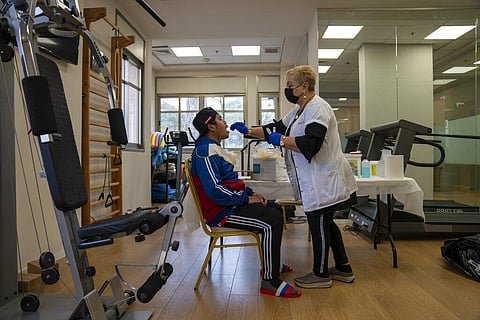COVID: Israeli ministry urges nixing travel ban amid Omicron surge
TEL AVIV: Travellers from the United States, the United Kingdom and other countries should be cleared for landing in Israel, the Health Ministry recommended on Thursday.
The ministry said all countries should be removed from Israel's "red' no-travel list, including the United Arab Emirates, the United States, Ethiopia, the United Kingdom, Tanzania, Mexico, Switzerland and Turkey.
The decision is one of several rapid changes in policy for Israel as the super-contagious omicron variant sets infection records around the world.
The ministry also recommended relaxing testing requirements for vaccinated and recovering inbound travellers, a day after the government recommended more home tests to ease the burden on testing centers.
The ministry's recommendations still have to go through a final, legal step, which is a formality, and are expected to go into effect at midnight Thursday.
The moves are a recognition that the variant is infecting more people but apparently not causing more severe illness and deaths, especially among vaccinated people.
On Thursday, the government reported another record for new infections, with more than 16,000 recorded a day earlier.
That's despite being a vaccination leader early in the pandemic and the first country to offer a 3rd vaccination, or booster shot.
Now, Israel is among the first to begin offering a 4th jab.
About 64% of Israel's 9.4 million people have received two vaccinations, and about 46% have received three shots.
Additionally, vaccinated and recovering travellers to Israel can leave quarantine after receiving a negative test result or after 24 hours.
Unvaccinated people can leave quarantine after testing negative twice, on landing and after a week of isolation.
Meanwhile,
Germany's biggest governing party said Thursday that it aims for a final decision by the end of March on the introduction of a universal vaccine mandate against COVID-19.
Parliament last month approved legislation that will require staff at hospitals and nursing homes to show that they are fully vaccinated or have recovered from the coronavirus by mid-March.
Progress toward a more contentious universal vaccine mandate is proving slower.
Chancellor Olaf Scholz has backed such a mandate, but wants to have lawmakers vote according to their personal conscience rather than on party lines.
The idea is for parliament to vote on proposals drawn up by groups of lawmakers rather than by the government.
There are divisions on whether a universal mandate is desirable within Scholz's three-party government, notably in the ranks of the Free Democrats, the smallest coalition partner.
And it isn't yet clear how the mandate would be designed.
Two senior lawmakers with Scholz's center-left Social Democrats, Dagmar Schmidt and Dirk Wiese, said in a statement Thursday that "we aim to conclude the legislative process in the first quarter of this year," news agency dpa reported.
They argued that a broad discussion on the issue is necessary "so we will take sufficient time for this," and advocated an initial debate in parliament this month.
The leader of the center-right opposition Union bloc's parliamentary group, Ralph Brinkhaus, said the government itself should draw up proposals.
He told ARD television that the shape of a universal vaccine mandate is a "leadership decision" and Scholz "can't delegate this to parliament now."
The Free Democrats' leader, Finance Minister Christian Lindner, flatly rejected the idea of changing the approach.
He said that deciding on the matter in a free vote is "a contribution to the reconciliation of society as a whole."
Neighbouring Austria has drawn up draft legislation to introduce a universal vaccine mandate, which the government hopes will take effect next month.

